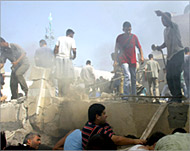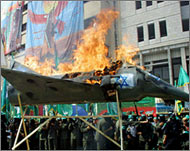Israeli refuseniks reap leaders’ abuse
When 27 Israeli Air Force pilots signed a letter refusing to take part in operations in the West Bank and Gaza Strip last month, they caused a national uproar.

While the pilots have become the target of their leaders’ vitriol, the letter has sparked a debate about both the refusenik movement and the Israeli policy of extra-judicial assassinations.
Prime Minister Ariel Sharon condemned the pilots during a radio address to the nation, as did both the Army and Air Force Commanders, Moshe Yaalon and Dan Halutz, who accused them of abusing their uniforms for political gain.
Three pilots have since withdrawn their names from the list, while four others have joined, bringing the total to 28.
The most striking name on the list is that of Yiftah Spector, a Brigadier General who is something of a legend among younger Israeli pilots for his role in the attack on Iraq’s nuclear reactor in 1982.
While the pilots are not granting interviews to any foreign press, their letter of refusal, submitted to the media, stated that they “are opposed to carrying out attack orders that are illegal and immoral of the type the state of Israel has been conducting in the territories … [and] refuse to continue to harm innocent civilians.”
Illegality and immorality
The letter further expounded on the illegality and immorality of such acts and on the corruptive nature of the occupation on Israeli society. “Perpetuation of the occupation is fatally harming the security of the state of Israel and its moral strength,” they said.
According to Yesh Gvul, an Israeli peace group which campaigns against the occupation by backing soldiers who refuse duties of a repressive or aggressive nature, there are approximately 1200 soldiers, reservists, and young draftees who refuse to serve in the Occupied Palestinian Territories (OPT).
 |
|
Palestinians search for survivors after an air strike in Gaza City |
About 300 of them have served prison terms. The latest additions to the list of refuseniks, however, are considered particularly significant because of the elite status of the Air Force and its combat pilots in Israeli society.
“The pilots have made a particluar impact because the army makes such a big deal about them. [They ] are the crème de la crème, the top, the best, the select. So when there is refusal in the air force, it impacts public opinion,” said Peretz Kidron, spokesperson of Yesh Gvul and author of the book Refuseniks which will be released in the UK next month.
Personal outrage
Kidron believes that the pilots signed the letter of refusal both as an expression of their individual morality and also with the aim of affecting Israeli operations in the territories.
“Everybody does it as a personal act of outrage but in the hope that other people will join and ultimately put an end to the bloodshed. This is the kind of protest where people are prepared to put themselves on the line – their status, their jobs. This is what makes it so impressive,” Kidron told Aljazeera.net.
Others disagreed, citing the pilots’ lack of support and their limited numbers as barriers to any real impact.
“It’s only significant in that these pilots realise how inhumane [targeting populated areas] is. But their voice is not truly heard. They are not supported,” said Labib Nasir, spokesman for MIFTAH, the Palestinian Initiative for the Promotion of Global Dialogue and Democracy.
“To me this reflects that not enough people in the [Israeli] army are fully aware of the kind of targets they are hitting. These are people who have no regard for human life if they consciously continue to shoot missiles into urban areas,” he told Aljazeera.net. “I hope [the letter] changes that and makes people in Israel want to learn more and question what they hear … that’s what a democracy is about.”
Assassination policy
|
“It is hard to be called a traitor or a coward by friends with whom you’ve flown for years” Captain Yonatan, |
Unlike their fellow refuseniks in the army who believe their mere presence in the OPT is unethical, the pilots are refusing to carry out a specific operation: the “targeted killings”, a euphemism for extra-judicial assassinations of suspected political activists and guerrillas. Carrying out such orders, contend the pilots, makes them war criminals.
The Israeli human rights organisation B’Tselem reports that at least 123 Palestinians have been killed as a result of extra-judicial assassinations launched by the Air Force. Eighty-four of these victims – about 70% – were civilian bystanders. Extra-judicial killings are illegal under international law and qualify as war crimes under Article 147 of the Fourth Geneva Convention and Article 85 of the 1977 Additional Protocol to the Geneva Convention.
The pilots are said to have been particularly affected by the largest of these operations in July last year, when an F-16 pilot dropped a one-tonne bomb on the house of Hamas leader Salah Shehade in a crowded Gaza neighbourhood. The bomb killed Shehade, along with 14 other civilians, including women and children.
Yesh Gvul has filed a petition with the Supreme Court urging the state to investigate the bombing. After both the chief military prosecutor and legal adviser to the government turned them down, they took their case to the Supreme Court.
“And if we don’t get some kind of recourse there, we’ll go elsewhere,” Kidron told Aljazeera.net. He said that they filed the petition in part to alleviate some of the pressure on the pilots.
“I think it’s a positive step. But it’s a very, very small step,” said Nasir. “These are the few that are looking beyond and sticking to principles of humanity.”
The pilots’ refusal comes at no small cost. They have faced trial and sentencing by media, and been pressured by family and friends, causing a few to recant.
|
“Political refusal is the mother of all dangers to this nation. Refusal should not be a part of our language” Dan Halutz, |
“It is hard to be called a traitor or a coward by friends with whom you’ve flown for years,” said Captain Yonatan, one of the refusenik pilots, to the Jerusalem Post.
The government has launched an offensive against the pilots, accusing them of “helping the enemy” and describing their letter as “pretentious snivelling”.
Grounded
This comes at a time in Israeli society where the peace movement is marginal at best and public opinion is ambivalent about any action viewed as jeopardising the nation’s unity.
The pilots, seven of whom are on active duty, have also been grounded by the head of the Israeli Air Force and could face possible dismissal or time in jail.
Despite this, the pilots’ controversial stance has received sympathy in some quarters. Letters of support have flooded their unofficial website, www.tayasim.org.il, and 200 Israeli professors and university students signed a petition on 1 October, supporting their decision.
The Israeli refusenik movement is comprised of officers inclined towards refusal, in principle if not in practice, and got its start during the Lebanon War. Throughout the second Intifada, the number of refuseniks has shot up to over 1200 from just a couple of hundred three years ago.
According to Yesh Gvul, the refusal campaign is part of a whole education process, where soldiers are made aware that they are morally and legally responsible for their actions.
Needless to say, refusal to serve has not been looked upon kindly by the Army. Halutz shot down the pilots’ letter by stating that “Political refusal is the mother of all dangers to this nation. Refusal should not be a part of our language.”
Mild approval in Palestine
 |
|
Palestinians burn a model of an Israeli warplane in protest at the assassination policy |
As for Palestinians, many are following closely as the Israeli drama unfolds. Overall, news of the Israeli refusal seemed to be well received. But most saw it as a relatively small step, albeit one in the right direction.
“Frankly, if they even tried to do this in any Arab country, they’d execute them before they got the chance. It’s admirable,” said a prominent member of Hamas.
However, it makes little difference to people facing the daily reality of occupation.
“Look, I think it’s a noble effort, but I also believe its just their personal opinion. They are taking a stance for themselves because they feel it is morally wrong” said Khamees al-Alawi, a shopkeeper whose nephew was fatally shot in the head by Israeli forces last week as he was playing with his friends in the central Gaza Strip.
“They are expressing their opinion, and you can do that in a democracy,” he said. “But it’s not a practical step, it’s not significant.”